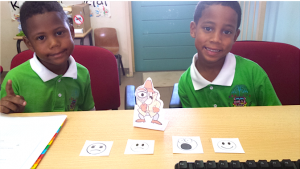Francois wanted to take away the toy that Mathias was playing with, but Mathias would not let the toy go. Francois got mad and kicked Mathias in his belly. Mathias got scared, cried from the pain and told the teacher on Francois.
When students are sent to the principal because of their misbehavior, Mr. ORID takes charge of the conversation and guides the students (ORID facilitation method) to reflect and solve their social-emotional difficulties.
At the end Francois learned that he has to wait for his turn or ask if he can play with the toy instead of the way he reacted. Mathias learned that he has to say ‘No’ and not to stay quiet but was praised for notifying the teacher.
The Principle, Mr. Gino Vrolijk is learning imaginal education practices in the post-secondary certificate program called Education Leadership for Collaboration offered by the University of Aruba and taught by Jan Sanders, Robertson Work, Skye Burn and Doug Banner.

Hi all,
We also call this restorative practice, which when such practice is embedded in a school as a way of life – transformational image change occurs. (Restorative Justice global movement) – the two processes have a similar basis.
Expanding on Robyn’s comment, I insert the Restorative Questions used in small conference settings that include both the person(s) harmed, and the person(s) who caused the harm. Where appropriate, supporters for both sides may be added to the group:
>Note: I would like to see the questions used in an ORID conversation, for comparison.
Restorative Questions; International Institute for Restorative Practice
http://www.iirp.edu
Restorative Questions I: To respond to challenging behavior
(Addressed to the person who caused the harm)
1. What happened?
2. What were you thinking of at the time?
3. What have you thought about since?
4. Who has been affected by what you have done? In what way?
5. What do you think you need to do to make things right?
Restorative Questions II: To help those harmed by other’s actions
1. What did you think when you realized what had happened?
2. What impact has this incident had on you and others?
3. What has been the hardest thing for you?
4. What do think needs to happen to make things right?